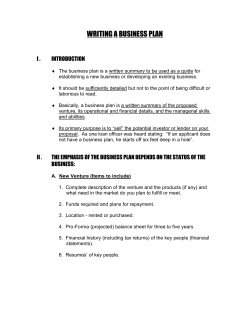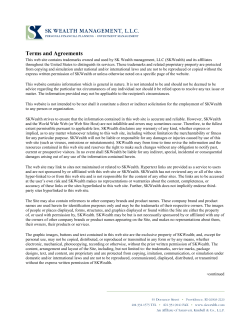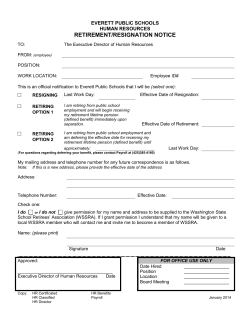
MassMutual Business Owner Perspectives Study 2011 insights in an uncertain economy
A Guide for Business Owners MassMutual Business Owner Perspectives Study 2011 insights in an uncertain economy Contents 2 | Start-up stage Reasons for owning a business Sources of business financing Views on managing finances 4 | Growth stage Top business planning concerns Financial product ownership Planning for retirement 7 | Maturity and transfer stages Views on business valuation Business succession planning “ Whenever you see a successful business, someone once made a courageous decision. ” – Peter F. Drucker Start small, dream big. That’s the mantra for many of the 5.9 million small business owners across the country.1 But turning dreams into reality in light of the struggling economy and the rising cost of living has become challenging. Couple that with shifting consumer trends and uncertainties around taxes and health care and it’s easy to see how the resolve of today’s business owners is being tested. A 2011 study of business owners conducted by GfK Custom Research North America for Massachusetts Mutual Life Insurance Company (MassMutual) reveals that today’s business owners face many challenges in achieving their dreams. The research shows that most business owners want control over their finances and view planning for their financial future as very important. Yet, few are satisfied with their current financial situation. This underscores the need for financial knowledge and preparation. There are four stages in the evolution of a closely-held business – start-up, growth, maturity and transfer. Our findings indicate that, depending upon the stage of the business, there are different concerns faced by business owners, and addressing those challenges may prove critical to ensure that a business thrives and survives. Business owners and their businesses are the backbone of our country’s economy. In fact, small businesses in the U.S. represent the fourth largest economy in the world2 and have generated 65% of all new jobs over the past 15 years.3 They are also your peers. The MassMutual Business Owner Perspectives Study takes the pulse of today’s business owners. The results provide you with an opportunity to reflect upon the successes and challenges in your business so that you can face the future, both in your professional and family lives, with greater confidence. 1 U.S. Census Bureau, Statistics of U.S. Businesses, 2008 2 CIA World Fact Book, Published 2010 3 U.S. Dept. of Labor, Bureau of Labor Statistics, 2008 Start-up stage Our study focused on three main topics for start-up businesses – reasons for Top reasons for starting a business 1 | Provide financially for family 2 | Be your own boss 3 | Have more control of life, time, etc. owning a business, sources of business financing, and managing expenses. In the start-up stage, it’s all about validating the business model, maximizing cash flow and minimizing risk, and acquiring the necessary knowledge to be a successful business owner. “To be a provider” tops reasons for owning a business According to our respondents, the main motivation for owning a business, 4 | Have strong passion for craft or trade like most people who work for a living, is to provide financially for 5 | Already in family and took it over when owner retired quarters of the business owners in our study. the family. Not surprisingly, this was the major reason for over three- But digging a little deeper, we found other underlying reasons people choose the path of business ownership. Both being your own boss and having more control of time were a major motivation mentioned by over half of the respondents, highlighting the importance of the independent lifestyle that is afforded by business ownership. These reasons were followed closely by having a strong passion for a craft or trade, which tells us that, at the end of the day, many business owners start a business out of a labor of love. Business owners tap different sources for business financing If starting a business were easy everyone would do it, right? The truth is many business owners, about one-fourth, are struggling financially, saying “it’s all I can do to keep up with everyday expenses, let alone think too much about the future.” Often times, it’s finding the necessary financial capital that is the biggest obstacle in starting, and ultimately growing, “ a successful business. According to our respondents, the sources their The first thing you learn in business is no one has to pay you. ” – male, business owner 2 businesses depend on to stay afloat are: 1 | Bank loans – 42% 2 | Personal savings – 31% 3 | Credit cards – 22% 4 | Family and friends – 12% 5 | Small Business Administration (SBA) loans – 9% Business owners want control over their finances, but are not satisfied with where they stand Business owners prefer a hands-on approach when it comes to managing their finances. Nearly 80% said they want to be actively involved in all decisions regarding their personal finances and two-thirds said they manage their business’ everyday expenses to avoid going into debt. Business owners are also confident in their ability to manage their finances, with over half saying they are very good at managing money. However, and perhaps more telling, less than half of our respondents are satisfied with their current personal financial situation. This underscores the importance of having a team of advisors, including an accountant, attorney, financial professional, and others working together to effectively manage and protect the financial interests of the business. Appointing a “quarterback” of the advisory team will also help bring the best thinking of all the advisors together to help ensure they are working in concert for the greater good of the business. Percentage who agree Views on finances I want to actively be involved in all decisions regarding my personal finances 79% Financial planning for the business is very important 67% I manage my business’ everyday expenses to avoid going into debt 66% I’m very good at managing money 58% I’m satisfied with my current financial situation 45% “ Finances and just the economy [keep me up at night]. It’s been terrible these past couple of years. ” Using life insurance to collateralize a business loan Businesses go through several stages of development and may require additional financing, perhaps to increase inventory, retool equipment, expand the building, or develop a new market. Lenders often find themselves reviewing many worthwhile loan applications, but many are declined due to a lack of adequate collateral. Life insurance as collateral is one option to close a business loan. When a life insurance policy is used to collateralize a business loan, your lender retains “collateral assignment” of the policy while your loan is in effect. That means if the person insured by the policy (the business owner) dies while the loan is in effect, your lender has the right to claim a portion of the policy proceeds equal to the outstanding loan balance. Any remaining proceeds are paid to your beneficiary. Once you’ve paid off your loan, you can remove the collateral assignment and your lender will no longer have any rights to the policy. – female, business owner 3 Growth stage As a business moves to the growth stage, the focus begins to shift from “let’s just survive” to “it’s time to thrive.” Business owners in the growth stage are looking to diversify their business interests to augment cash flow, and thus, need leaders and talent to support the increasing demands. In addition, business planning to protect the long-term viability of the business becomes a necessity. Our study looked at how business owners view key planning topics in the growth stage, including key employee retention, protection planning, and retirement income strategies. Keeping key employees loyal is a top concern, but few are addressing the issue We asked business owners how concerned they were about some potentially critical business planning issues. Keeping key employees loyal to the business was the most common concern, and was mentioned by over half of the business owners surveyed. However, less than a third of the respondents say they offer special benefits to their key employees. This underscores the common disconnect that occurs between what business owners recognize as “ Finding good employees [keeps me up at night]. It is hard to find someone who is willing to work as hard as me. ” – male, business owner 4 a concern versus actions they’ve taken to solve their issues. Business planning concerns Percentage who consider it a major concern Percentage who have taken action to address the concern Keeping key employees loyal to the business 53% 30% offer special benefits for key employees How the business would be affected by the possible death of an owner or key employee 44% 32% have a buy-sell agreement triggered by death of an owner How the business would be affected by the possible disability of an owner or key employee 40% 25% have a buy-sell agreement triggered by disability of an owner Protecting assets from lawsuits, seizures, etc. 38% 30% have a business asset protection plan Transitioning ownership or finding a buyer when owner is ready to retire 32% 26% have a formal business succession plan Who will run the business if an owner leaves, becomes disabled, or dies 31% 26% have a formal business succession plan Handling estate taxes in the event of an owner’s death 25% 46% have an estate plan Life insurance tops financial products owned, but maintaining independence of highest concern The business owners we surveyed recognize the value of life insurance as an integral component of their business and personal planning. However, when we asked business owners to share their level of concern regarding some common personal planning issues, protecting assets and remaining as independent as possible if you require long-term care was of high importance to the greatest number of business owners. Yet, long-term care (LTC) insurance ranked the lowest among business owner product ownership. While 29% say they have LTC insurance, this may be overstated as there is much confusion about it in the marketplace. In reviewing your own personal and business protection plan, be sure you in fact have the proper insurance in place that protects your assets and preserves your independence, while helping relieve family and friends from the burden of providing for your care later in life. Percentage of business owners owning a financial product 100% I’m not worried about much except my own personal health. ” – male, business owner 85% 80% “ 76% 71% 60% 40% 41% 39% 29% 20% 0% Qualified Investments Individual Individual Life Insurance Retirement Disability Savings Income Plan Insurance Annuity Long-term Care Insurance 5 Business owners underestimate the importance of a formal retirement income strategy There are some conflicting results from the survey when it comes to retirement planning. The average expected retirement age of today’s business owners is 68 and less than half are confident they are doing a good job preparing financially for their retirement. Yet, funding retirement is a strong concern for only one in three. Perhaps this percentage is not higher because, as previously noted, many have a qualified plan and/or investments outside of a pension plan to help fund their retirement. In fact, the business owners we surveyed mentioned three primary sources for retirement income with equal frequency: • Personal savings or investments • Pension or qualified retirement plan • Proceeds from the sale of the business “ [My main worry is] trying to find a way to retire without putting a whole lot of people out of work. ” – female, business owner But even with these various sources of retirement income at their disposal, only one-third of business owners we surveyed have a formal retirement income strategy in place – in other words, a plan to put these financial vehicles into action. A sound retirement income strategy involves determining ways to have income for life, providing access to income when you need it, managing potential health care expenses, and leaving a legacy to the next generation. And keep in mind that while proceeds from the sale of your business should be a component of your retirement income strategy, it should not be something you solely rely upon. Percentage of business owners with a formal plan in place 100% 80% 60% 47% 45% 40% 35% 18% 20% 0% 6 Estate Financial Retirement Income College Savings Maturity and transfer stages Business owners in the maturity stage are leveraging the infrastructure they’ve built. Many have senior leaders and key employees operating the day-to-day operation of the business. They also begin to recognize that it’s time to start planning for the next stage of their business and life – maybe pass it on to their children and retire or sell it and start a new business venture. This starts the transfer stage. Our study looked at a few common concerns facing business owners in these stages, including knowing what the business is worth, succession planning, and choosing a successor. Most business owners say they’ve had their business valued, but not really Knowing what your business is worth is critical for proper business planning. Four in ten business owners we surveyed feel that it’s “extremely or very important” to know what their business is worth, and nearly six in ten say they’ve had a business valuation done in the past three years. Here’s the problem: one-quarter of those who claim to have done a business valuation, did it on their own. A proper business valuation is not a “rule of thumb” or a figure agreed to with a handshake; it’s thoughtfully crafted by a credentialed appraiser after thorough research and is documented in writing. Having an accurate business valuation can help eliminate conflict between a buyer and a seller when an owner wants to transition the business, help business owners better estimate their retirement nest-egg, and help prevent potential estate tax issues. What to look for in a business valuator A typical business owner misjudges the value of a company by 59%.4 That’s because business owners often use “rules of thumb” that assume one business is identical to every other business in that industry – the reality is every business is as unique as a fingerprint. Business valuation is not an exact science. It is based on the key financials of the business, market conditions, the industry in which the business operates, the nature of the business, and informed judgment. Many business owners choose to have a CPA conduct their business valuations. Be sure that any firm or individual you hire to value your business has the proper credentials, such as: • Certified Valuation Analyst (CVA) Who determined what the business is worth? • Accredited Valuation Analysis (AVA) • Accredited Senior Appraiser (ASA) Legend 1 50% Accountant 23% Self/Partners Spardata, survey of business owner clients, 2010 4 19% Valuation Company 0% • Accredited in Business Valuation (ABV) 10% 20% 30% 40% 50% 60% 7 Business owners have chosen a successor but few have a plan in place to make it happen Most of the business owners we surveyed say they have chosen their successor – in most cases it’s a family member. And, over 80% of those who have chosen a successor claim that this individual knows he or she has been chosen – although 17% don’t know. However, only about one-fourth of all businesses surveyed say they have a formal succession plan (specifically for the retirement, death or disability of the owner), and only one-third say it’s a major concern. Who’s being chosen as the successor? 54% Family 16% No one, will sell “ My company is getting older as I do. There is no one who can continue my business. ” I don’t know/ Haven’t thought about it Non-related key employee 0% 15% 6% 10% 20% 30% 40% 50% – male, business owner Does he or she know they are the successor? 17% Yes No/Don’t know 83% 8 60% Le A formal succession plan should be designed to protect the business from the four D’s – death, disability, divorce and departure. For example, a Buy-Sell Agreement, when properly executed and funded, can help ensure the continuity of the business when ownership needs to change hands. It is a legally binding agreement that requires one party to sell and another party to buy ownership interest in a business in the event of the death, disability or retirement of an owner. If a buy-sell agreement is in place, it’s important to make sure it’s funded in accordance with the current value of the business; otherwise it won’t accomplish what’s intended. A courageous decision is a good decision Being a business owner, particularly in today’s economic climate, is truly an honorable and courageous endeavor. A successful business begins with Methodology The research was conducted by GfK Custom Research North America for Massachusetts Mutual Life Insurance Company (MassMutual) via telephone interviews administered to 916 general population business owners from March 28 – May 20, 2011. Businesses were required to meet the following criteria: planning for and building a strong financial foundation. Business planning ·· Have 500 or fewer employees is not something that’s done overnight. But our hope is that this research ·· 2010 total sales or revenue of $50,000 or more will provide you with ideas about the steps you can begin to take right now to set your business on the road to a more financially secure future. At MassMutual, we recognize the challenges you face and are equipped to help you prepare for the future with more confidence. Our goal is to help you stay focused on the task at hand – running your business – while working in concert with your trusted advisors to help you create a financial road map for the long term success of your business. In fact, we have financial professionals who are trained and certified to work specifically ·· Been in business at least 1 year The sampling margin of error for this study is +/– 3.3 percentage points when looking at the results for Total General Population. These are at the 95% confidence level. with business owners like you. Put our qualities of strength, experience and stability to work for your business. To learn more about how MassMutual can help you protect what you’ve worked so hard to build, visit massmutual.com to find a MassMutual financial professional in your community. Take the next step toward creating a solid business strategy and achieving fiscal fitness. 9 © 2011 Massachusetts Mutual Life Insurance Company, Springfield, MA 01111-0001. All rights reserved. www.massmutual.com. MassMutual Financial Group is a marketing name for Massachusetts Mutual Life Insurance Company (MassMutual) and its affiliated companies and sales representatives. SB10221 1011 CRN201309-152111
© Copyright 2025













